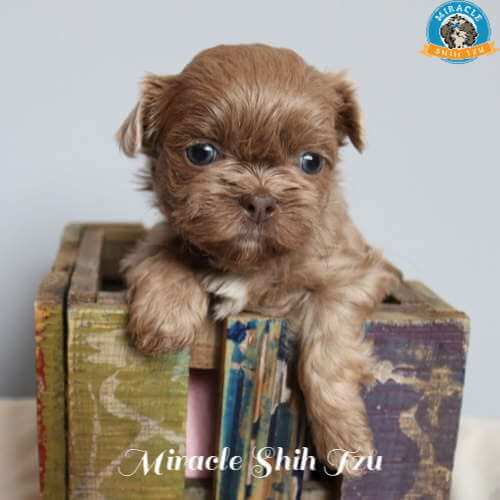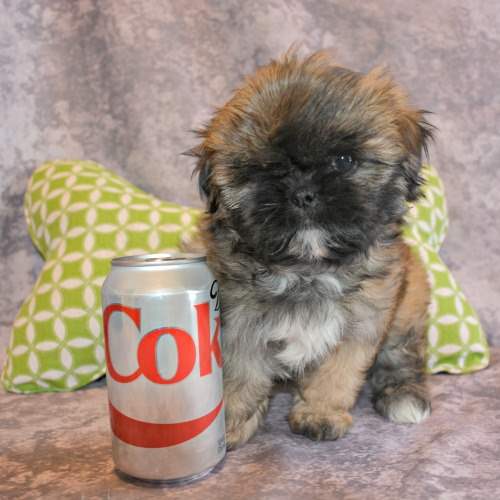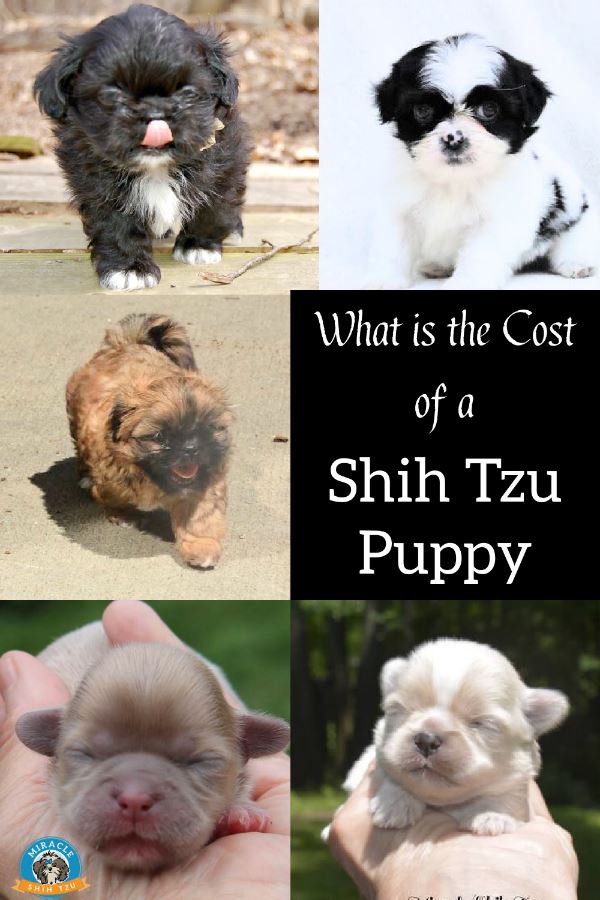- Home
- Dog Ownership
- Cost of a Shih Tzu Puppy
What is the Cost of a Shih Tzu Puppy (2023)
Cost of a Shih Tzu Puppy by Mikail Khan |Published 06-26-2023
People often wonder what the average cost of a Shih Tzu puppy is. This is because Shih Tzus are popular family dogs, and people want to be sure they can afford one before bringing one home.
How Much Should You Expect To Pay for a Shih Tzu Puppy

The average cost of a Shih Tzu puppy is between $500 - $2400 USD. This price range is due to the many variables such as a breeder experience, location, coat color and pattern, and whether the puppy is being purchased with full AKC registration or without.
And, Some rare kinds of Shih Tzu, such as the Teacup Shih Tzu, can be a lot more expensive, with a price tag of up to $3000.
You may also find puppies below the average price, but be aware that these puppies may come from puppy mills that may not have received the proper care and vaccinations.
And, Some rare kinds of Shih Tzu, such as the Teacup Shih Tzu, can be a lot more expensive, with a price tag of up to $3000.
You may also find puppies below the average price, but be aware that these puppies may come from puppy mills that may not have received the proper care and vaccinations.
Puppy Mills are large-scale commercial dog breeding organizations prioritizing profit over the dogs’ welfare.
These low-priced puppies are not carefully bred and are more likely to have health and behavioral problems. If you purchase a puppy from a pet store, there is a possibility that the puppy originated in a puppy mill.
Except for a few exceptions, I recommend not purchasing a Shih Tzu puppy below $500. Not only these poorly bred puppies will not meet the breed standards but when they grow up they may lack the classic appearance of the breed.
Why Are Shih Tzu Puppies So Expensive?

Several factors contribute to the high cost of Shih Tzu puppies.
The Cost of a Shih Tzu Puppy? Popularity
The Shih Tzu is one of the most popular dog breeds in the United States. Unfortunately, their popularity means that there is a high demand for puppies, which drives up the price.
AKC Registered Shih Tzu
The American Kennel Club (AKC) is the most well-known dog registry in the United States. It is a not-for-profit organization that sets the standards for all purebred dogs and registers litters of puppies.
Shih Tzu registered with the AKC are more expensive than those not because they meet a higher breeding standard.
Show Quality and Pet Quality
There are two types of Shih Tzu puppies, show quality and pet quality. Show quality puppies are bred to meet the AKC standards for the breed, while pet quality puppies do not meet these standards. That does not mean that pet quality puppies are inferior, rather, it means that the breeder concentrates on other factors such as personality and health rather than confirmation.
As a result, show-quality puppies are typically more expensive than pet-quality puppies. Be aware that if you do plan to show, you will want to accept the higher costs and find a show breeder who will be receptive to working with you.
Cost of a Shih Tzu Puppy? Coat Color and Pattern

The coat color and pattern of a Shih Tzu can also affect its price. The most common coat colors are black, white, and gold.
However, there are also less common colors, such as blue, red, and liver. Some of the rarest and most expensive coat colors are silver, gold, and liver.
The coat patterns of Shih Tzu can also be a factor in price. The most common coat patterns are solid, bi-color, and parti-color.
Less common coat patterns, such as brindle, are typically more expensive.
Size
The size of a Shih Tzu can also affect its price. Teacup Shih Tzu are the smallest size of the breed and are typically the most expensive, even though they may not be as healthy.

Breeder's Expenses
The breeder's expenses are also a factor in the cost of Shih Tzu puppies. Good breeders invest a lot of money in their dogs, including the cost of food, vet care, vaccinations, and routine health care.
There may be other costs involved such as DNA testing, progesterone testing, artificial insemination, and C-sections.
They also spend a lot of time researching the breed to ensure they are producing healthy, well-socialized puppies.
Litter Size
The litter size can also affect the price of Shih Tzu puppies. The litter of Shih Tzu contains about 2 - 3 pups. So little litter size and higher expenses mean the breeder has to charge more per puppy.
Location
The breeder’s location can also affect the price of Shih Tzu puppies. Think of it as supply and demand.
For example, there are many breeders in southern states; hence the prices are lower. On the other hand, there are few breeders in the New England area, so the prices are relatively high.
Other Factors That Affect the Cost of a Shih Tzu Puppy
One of the most overlooked reasons why Shih Tzu puppies may be expensive is the breeder. Some breeders charge more for their puppies because they can. This is especially true for novice breeders who feel they are worth more than they are. It goes both ways, though so it's not always the breeder's fault. If a person falls in love with a puppy photo, they may agree to pay to pay more than the puppy is worth without doing their due diligence. The best way to avoid this trap is to read on and learn what questions to ask.
How Much Does a Shih Tzu Cost per Month?
The cost of owning a Shih Tzu doesn't stop when you bring your puppy home. After budgeting for the initial supplies you will need such as a crate, dog bed, bowls, and a harness, you will also need to factor in the monthly costs of food, supplies, vet care, and more. Just the cost of professional grooming alone can make owning one of these dogs cost prohibited.
According to the American Kennel Club, the average monthly cost of owning a small dog like the Shih Tzu is around $200 (Approx $2500 yearly). This includes the cost of food, supplies, training, vet care, and other miscellaneous expenses.
How To Find a Reputable Breeder for a Shih Tzu Puppy
You will have a better chance of getting a quality bred Shih Tzu if you buy from a reputable breeder. Here are some tips on how to find a reputable Shih Tzu Breeder:
Word of Mouth
One of the best ways to find a good breeder is to ask around for recommendations. Talk to your veterinarian, friends, and family members who own Shih Tzu. They may know of a breeder they can recommend.
Do Some Research
After getting some recommendations, it's time to do some research. First, visit the websites of the breeders that were recommended to you and take a look around.
Look for signs that the breeder is responsible and cares about the health and wellbeing of their dogs.
Ask Questions
Once you have narrowed your list of potential breeders, it's time to ask questions.
Some things you may want to ask include:
- How long have you been breeding Shih Tzu?
- How do you socialize your puppies?
- What health tests do you perform on your dogs?
- Can I see your kennel/facility?
- Do you have any references I can contact?
- Will I be able to meet both parents?
- Can you tell me why your puppies are so expensive?
A reputable breeder that is also ethical will gladly answer any question you might have to the best of his or her ability. If you don't like the answers you get, move onto the next and pose the same questions.
How Do I Know if My Shih Tzu Is Purebred?
There are a few things you can look for that will help you determine if your Shih Tzu is purebred.
First, take a look at the dog's registration papers. If the dog is registered with the American Kennel Club (AKC), this is a good indication that it is purebred.
Another way to tell if your Shih Tzu is purebred is to look at its physical appearance. Purebred Shih Tzu should have a distinctive "teddy bear" look with large dark eyes, large ears that rest at the side of the dog's head, and curled tail.
Finally, you can have your dog's DNA tested to be sure. Several companies offer this service, and the test is typically very accurate.
Take Your Time
Don't rush into buying a Shih Tzu puppy. Instead, be patient and take your time to find the right breeder and puppy for you. It's important to remember that this is a lifelong commitment, so you want to ensure you get a dog from a responsible breeder with the dog's best interests at heart.
Pin for Future Reference
Author Bio
Mikail Khan is the founder and editor at BestDogResources.com.
Since he got his first puppy, Mikail has been a lover of dogs. He aims to
provide simple and easy informational advice to dog owners.
"Hi, I'm Janice Jones, a former veterinary technician and Shih Tzu expert with over 40 years of experience with the breed. Through Miracle Shih Tzu, I combine my medical background and extensive breed knowledge to provide reliable, practical advice for Shih Tzu owners. My mission is to help you give your Shih Tzu the happiest, healthiest life possible through evidence-based information and real-world solutions. Whether you're new to the breed or a seasoned owner, you'll find trusted guidance here for all aspects of Shih Tzu care.
I hold an undergraduate degree in Psychology with a minor in biology, Early Childhood Education, and Nursing, and a Master's in Mental Health Counseling.




